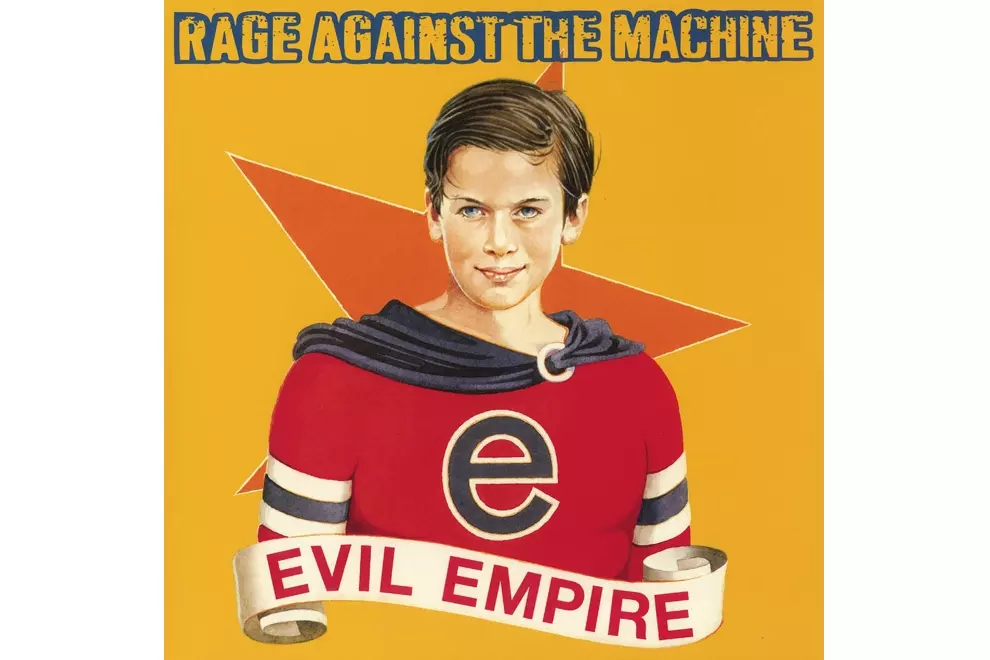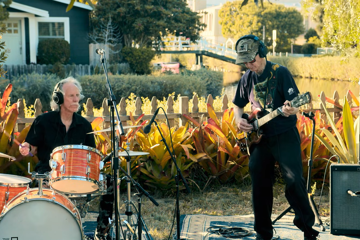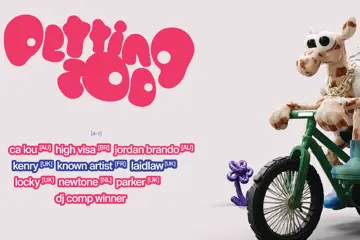Released on April 16th, 1996, 'Evil Empire' was the second piece in a three-act political rock puzzle for Rage Against The Machine. It's a great album, but also imperfect: the over-reliance on repetition for its musical impact, to allow the message of any given song to cut through properly, does make matters extremely routine. In a world of the almighty algorithms amplifying everything, where something's presence can spread like inescapable tendrils, it's no surprise 'Bulls On Parade' overshadows the album and is so omnipresent today. (Every second dollar-store metalcore band covering it didn't help.) With 'Evil Empire' recently reaching the quarter-of-a-century milestone, looking back, it's not hard to see why certain portions are overlooked. Yet it's also clear to see why this fired-up second record (and the band's) legacy remains steadfast. For this was no "sophomore-slump," just the next step in what was an illustrious career.
The success of Rage Against The Machine's debut album didn't corrupt or water the band down in the four years between it and 'Evil Empire.' If anything, it seemed to make them more driven! Crisply produced by Brendan O'Brien (AC/DC, Pearl Jam, Bob Dylan, Bruce Springsteen), who truly captured the band in their element and gave them enough sonic spit-polish, 'Evil Empire' had giant shoes to fill as the follow-up to the funky rap-rock and strong political views of their 1992 classic. And it mostly filled them, at best showing that the band could do it, that that first album wasn't just dumb luck. Like its predecessor, Rage Against The Machine's emphasis on dry recordings, punchy tones and most importantly, real performances is what made it so impactful. That, and the larger usage of lyrical information as a tool for education, to use the music as a vehicle for spreading awareness on various struggles and issues the world over. Yet what holds those two key ideas together is the four people behind the name.
If it was anyone else in this band, this album - Rage's catalogue and footprint - wouldn't be anywhere as impressionable. These songs that countless connect with would not be as robust if there was but one different face in Rage's line-up. (And if these songs weren't still so fucking relevant today!) It's the four big and strong opinionated personalities of the band, the very kind that created issues personal issues that resulted in their break-up, that made these songs what they are.
One of the best rhythm sections in all of rock is drummer Brad Wilk and bassist Tim Commerford. They are of the utmost importance to Rage's DNA. Their synchronicity is paramount to the incredible sense of groovy forward momentum this band displayed in the studio and when playing live. Tom Morello's deceptively simple "fuck around and find out" style in how he approached his solos and tones is iconic. The delay-pedal fun and helicopter noises he got out of six-strings via unconventional methods is a staple of him, 'Evil Empire,' and the band. Then there's Zack de la Rocha, one of the most outspoken and humble frontmen rock's ever seen. Zach's aggressive and political shout-rap delivery is informed by a mixture of cultures, genres and hard leftist ideologies. If there's an element that bests embody the message and the medium of RATM, it's Zach. The presence he commands and the power of his words, of what he's educating people on here, is something seldom matched in the decades since.
[caption id="attachment_1109735" align="aligncenter" width="760"] Rage Against The Machine, 1996, photo taken from the physical CD.[/caption]
Rage Against The Machine, 1996, photo taken from the physical CD.[/caption]
Don't miss a beat with our FREE daily newsletter
For Rage, the medium was always the message; an intersection of different styles and cultures to create a true sound of dissent. That's the case for ALL of their records. As radical as this band's views were in all senses of the word, it's also the authentic performances and explosive songwriting that had their legacy endure. It wouldn't work with just one of those components; both were required for maximum effect. It's why people who saw RATM live around this period spoke with such reverence; their studio albums were basically live recordings already, and 'Evil Empire' had no lack of strong songs to talk about.
Take the jumpy opener, 'People Of The Sun', which is just groove-city. When the band repeat the chorus for the third and final time, it's peak Rage and possibly my favourite song of theirs. 'Vietnow' is a solid example of RATM utilising one rhythmic idea, the same verses, over and over again until they build up like a volcano and finally erupt with hardcore fury. 'Revolver' slithers and slinks around like something evil. One minute it's quiet and sleuthing, the next it's brash and violent, one of the darkest songs the band ever recorded. The snare drum flurry that begins 'Snakecharmer' sets off the kind of songcraft they'd later explore on their exceptional third record. Seriously, this song is like proto-'Battle Of Los Angeles'; coiled and ready to strike with its sinister maw open and capitalistic fangs sharpened. It's also a fine example of their metal groove and intensity though is often overlooked.
The skittish nature of 'Tire Me' has an insane urgency, the vocals moving fast and breathlessly. It sounds like the quartet is hanging on a knife's edge. A tension that never relents, not when the tom fills and snare flams arrive, and not when Zach's Inside Out days come out in quick snippets. I love how 'Down Rodeo' just starts. No preamble, no bullshit. With the album's sweetest half-time groove, the dissonant intervals are tense, and when the melodic change that announces the chorus lands, that "release" hits hard. And the song goes out with a furious bang before the dust settles and the track lays low as per Zach's "quiet, peaceful death" lyric. The whammy-bar addiction and stuttering noises on 'Without A Face' are so fucking cool, and the song's head-pummeling outro is huge with a capital H. 'Wind Below' sees things get super funky, with some of the noisest, harshest and kettle-boiling guitar work of the entire album. Some of it's genuinely terrifying, and the breakdown that closes out the song is an underappreciated head-banger. Even at the band's plainest - 'Roll Right' - it's not that bad. Then there's 'Year Of Tha Boomerang,' one of the most dynamic compositions Rage had at the time. While it's no doubt their weakest album closer, things still go out on a chaotic and rollicking high note.
The phenomenon of politicians and people not understanding that Rage was ALWAYS political is never not funny. Highly frustrating though, as it reveals how these people consume art and don't actually engage with it. For 'Evil Empire' is so obvious in its message. The instantly recognizable cover is a spin-off of Mel Ramos' Crime Busters piece, blatantly mocking the white face of America's imperialism, militarism, capitalism and foreign policy. (What sells it is the kid's smug face; a young man who actually wasn't a fan of Rage.) The title of "Evil Empire" is taken from Ronald Regan' depiction of the Soviet Union during a 1983 speech. In a nation grappling with the damage done by McCarthyism, this was Rage outright saying that how the U.S. talks about its enemies is easily applicable to itself. Inside the CD booklet, you'd find a photo of various political literary works from Howard Zinn, Karl Marx, William Powell, Che Guevara, Edward S. Herman, Noam Chomsky, and Mumia Abu-Jamal. Rage's unapologetic politicism ran deeper than the art, title, and packaging; they permeated into the pores of what these 11 songs were about. Existing in their subconscious beneath the surface of funk grooves, drop D guitar antics and calls to "Come with it now!".
For one, 'People Of The Sun' is dedicated to the original inhabitants of Mexico that were slaughtered by Spanish conquistadors, who have been exploited for centuries; a rally cry to reclaim their heritage. 'Bulls On Parade' looks at the "Nuclear Family", addressing how governments and leaders act in self-interests against ordinary citizens, keeping the populace in the dark for as long as possible; "they don't gotta burn the books, they just remove them". 'Vietnow' is an indictment of American's conservative radio used as propaganda; how those programs use fear to drum up their base and line their pockets. (Ghouls like Rush Limbaugh started it, and it's since become more grotesque through muppets like Ben Shapiro, Lauren Southern, Stefan Molyneux, and Candance Owens.)
I said before that 'Revolver' was one of the band's grimmest songs, as it's a look at abusive relationships, about the resilience of single mothers. 'Snakecharmer' critiques self-centred snake-oil peddled in favour of "The American Dream" and the maintained status quo. 'Tire Me' is about mortality, that no figure is an invincible being, lyrically referring to John F. Kennedy's wife, Jacqueline Kennedy Onassis. 'Down Rodeo' addresses poverty and white supremacy - "These people ain't seen a brown skin man since their grandparents bought one" - and is loaded with references to funk music and the Black Panthers. The group's support of the Zapatista movement is documented on 'Wind Below,' a track about the fight of Latin American revolutionaries. 'Without A Face' tackles immigration; a reminder that the topic of a border wall between America and Mexico, about intentionally harmful policies used to dehumanize immigrants, wasn't anything new under Trump. 'Roll Right' points out that the anti-communist fervour leading up to 'Evil Empire' created an easy, catch-all method to silence and demonise any opponent. Thus "rolling" the political spectrum more towards the conservative right as it was abused. Everything culminates with 'Year of tha Boomerang,' a "power to the people" piece, saying that the victory of the proletariats will come back around, much like a boomerang. Nicely tying back into the chorus of the album's first song, too!
As we all know, Rage was set to reunite and tour in 2020, but that got shit-canned for obvious reasons. Yet much like this 25th anniversary of 'Evil Empire', just like that boomerang, and just like the enduring messages behind the songs of Rage's stellar second album, it'll all come back around eventually. Because empires always fall.

















